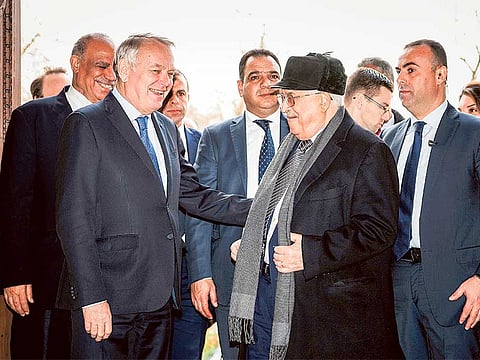Abbas threatens to end Israel cooperation over colonies push
Palestinian and Israeli rights groups petition regime’s supreme court to strike down ‘dangerous’ law

Paris: Palestinian President Mahmoud Abbas said on Wednesday that he could be forced to suspend security cooperation with Israel if the ramp-up of Israeli colonies continued.
“If the colonisation continues, I would have no other choice, it would not be my fault,” Abbas told France’s Senate during a visit to Paris.
On Tuesday, Abbas met French President Francois Hollande, who voiced concern over a law retroactively legalising about 4,000 colonist homes built on privately owned Palestinian land in the occupied West Bank.
Meanwhile, Israeli and Palestinian human rights groups petitioned the regime’s Supreme Court asking it to strike down the new law.
Israeli group Adalah and the Legal Aid and Human Rights Centre, which is based in occupied east Jerusalem, filed the request on Wednesday afternoon to overturn the “dangerous” law, which was approved by the Israeli parliament late on Monday.
It legalises dozens of wildcat outposts and thousands of colonist homes in the occupied West Bank, and prompted a Palestinian call for the international community to punish Israel.
The United Nations, the European Union and the Arab League strongly criticised the legislation on Tuesday, although the new administration of US President Donald Trump remained silent.
“This sweeping and dangerous law permits the expropriation of vast tracts of private Palestinian land,” Adalah’s lawyer Suhad Bishara said in a statement.
“It violates the property rights both of resident and refugee Palestinians.”
Israel’s attorney general has said the law is unconstitutional and could open the country up to prosecution at the International Criminal Court, based in The Hague.
The UN Security Council passed a resolution in December stating that colonies have “no legal validity” and demanding that Israel stop building in the occupied West Bank, including annexed east Jerusalem.
Bishara said the new law flouted that resolution.
“The transfer of the occupying power’s civilian population into occupied territory is a war crime,” she said.
Israel’s attorney general, Avichai Mandelblit, has said he will not defend it in court. Israeli Prime Minister Benjamin Netanyahu had initially expressed misgivings about the bill, reportedly saying it could drag Israel into international legal prosecution, though in the end he agreed to support it, but later said he supported it.
Sign up for the Daily Briefing
Get the latest news and updates straight to your inbox



